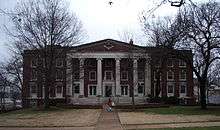Edith D. Pope
Edith D. Pope (1869 – 1947) was an American editor. She was the second editor of the Confederate Veteran from 1914 to 1932, and the president of the Nashville No. 1 chapter of the United Daughters of the Confederacy from 1927 to 1930. She played a critical role in the promotion of the Lost Cause of the Confederacy.
Edith Drake Pope | |
|---|---|
| Born | 1869 |
| Died | January 27, 1947 Williamson County, Tennessee, U.S. |
| Alma mater | Tennessee Female College |
| Occupation | Editor |
| Parent(s) | William Campbell Pope Mary Caroline Drake |
Early life
Edith Drake Pope was born in 1869 to a former slaveholding family.[1] She grew up in Williamson County, "less than one mile" from the John Pope House in Burwood, Tennessee, built by her paternal great-grandfather.[1] Her father, William Campbell Pope, served in the Confederate States Army during the American Civil War of 1861–1865.[1] She had two brothers and three sisters.[1]
Pope graduated from the (now defunct) Tennessee Female College in Franklin, Tennessee, in 1888.[1]
Career
Pope began her career as Sumner Archibald Cunningham's secretary; Cunningham was the founder and editor of the Confederate Veteran, a monthly magazine about veterans of the Confederate States Army.[2] When he died in December 1913, she became its editor until her retirement in 1932.[3]

Pope was an active member of the United Daughters of the Confederacy.[4] She was the president of the Nashville No. 1 chapter from 1927 to 1930, and its recording secretary from 1930 to 1935.[4] She helped install the Matthew Fontaine Maury Monument in Richmond, Virginia, and the Tennessee Confederate Women's Monument in Nashville.[4] She was also a member of the Confederate Memorial Literary Society,[4] which established the Museum of the Confederacy in Richmond; it was later renamed the American Civil War Museum.

Pope also played a key role in the construction of Confederate Memorial Hall at Peabody College (now Vanderbilt University) in Nashville, where she made sure the college would also teach a course on Southern history.[5]
Pope supported the Ku Klux Klan and Jim Crow laws.[1] She was a proponent of the "repatriation" of African-American United States citizens to Africa, and she was nostalgic about the American Colonization Society.[1]
Personal life and death
Pope resided in the West End neighborhood of Nashville, next to Centennial Park and Vanderbilt University.[1]
Pope died on January 27, 1947 in Burwood, Tennessee.[4]
References
- Simpson, John A. (2003). Edith D. Pope and Her Nashville Friends: Guardians of the Lost Cause in the Confederate Veteran. Knoxville, Tennessee: University of Tennessee Press. pp. 1–2, 23, 29–31, 45, 63. ISBN 9781572332119. OCLC 428118511.
- Moody, Wesley (2011). Demon of the Lost Cause: Sherman and Civil War History. Columbia, Missouri: University of Missouri Press. p. 107. ISBN 9780826272669. OCLC 842399455.
- "CONFEDERATE VETERAN RECORDS, 1904-1941" (PDF). Tennessee State Library and Archives. State of Tennessee, Department of State. Retrieved September 24, 2017.
- Simpson, John A. "Edith Drake Pope". The Tennessee Encyclopedia of History and Culture. Tennessee Historical Society and the University of Tennessee Press. Retrieved September 24, 2017.
- Simpson, John A. (2003). Edith D. Pope and Her Nashville Friends: Guardians of the Lost Cause in the Confederate Veteran. Knoxville, Tennessee: University of Tennessee Press. pp. 98–99. ISBN 9781572332119. OCLC 750779185.
External links
| Wikimedia Commons has media related to Edith Drake Pope. |